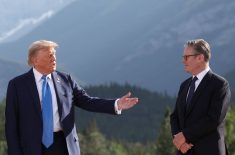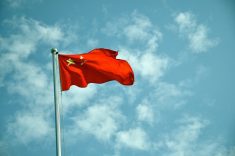Reuters — Canada will impose retaliatory tariffs on $16.6 billion worth of U.S. exports and challenge U.S. steel and aluminum tariffs under the North American Free Trade Agreement and the World Trade Organization (WTO), Canadian Foreign Minister Chrystia Freeland said on Thursday.
The Canadian tariffs are set to go into effect on July 1 and stay in place until the U.S. lifts its own measures, Freeland said, hours after the U.S. said it would impose tariffs on aluminum and steel imports from Canada, Mexico and the European Union.
Read Also

U.S. grains: Wheat futures rise on supply snags in top-exporter Russia
U.S. wheat futures closed higher on Thursday on concerns over the limited availability of supplies for export in Russia, analysts said.
“The American administration has made a decision today that we deplore, and obviously is going to lead to retaliatory measures, as it must,” Prime Minister Justin Trudeau said at a news conference in Ottawa with Freeland.
“We regret that. We would much rather move together in partnership,” he said.
The Canadian government released two lists of U.S. products, proposing a 25 per cent tariff on the first list and 10 per cent on the second. Freeland said a 15-day consultation period would give Canadians a chance to comment on the tariffs and the products covered.
The first list includes steel and aluminum in various forms. The second list includes some aluminum and steel goods, such as beer kegs, casks, tanks, wire and pipes, but also an array of different products, among them processed foods such as orange juice, maple syrup, ketchup, whiskey, yogurt, mayonnaise and soy sauce.
The second list also includes herbicides, insecticides and fungicides, but only “in packages of a gross weight not exceeding 1.36 kg each.”
Freeland said Canada would challenge the U.S. tariffs under both NAFTA’s Chapter 20 and the WTO’s dispute settlement process, and would work with other WTO members.
Canadian Steel Producers Association president Joseph Galimberti said his organization was consulting with members and studying the products covered.
“I think the key going forward is to take this time to make sure that it works for the parties most directly affected and to get those measures in place as soon as we can,” he said.
Trudeau also discussed NAFTA talks, saying Canada, the U.S. and Mexico had come so close to a deal that he had offered to meet personally with President Donald Trump in Washington.
Trudeau said Vice-President Mike Pence told him on Tuesday that as a precondition for that meeting, Trudeau would have to agree to a five-year sunset clause. He refused.
A sunset clause would allow one of the three NAFTA members to quit the pact after five years.
“There was the broad lines of a decent win-win-win deal on the table,” said Trudeau.
— Reporting for Reuters by Allison Martell; additional reporting by Rod Nickel in Winnipeg.
















